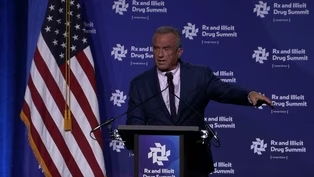
UK Sleep Study
Clip: Season 3 Episode 236 | 3m 12sVideo has Closed Captions
Researchers at the University of Kentucky want to know how well people sleep.
Researchers at the University of Kentucky want to know how well people sleep. The university launched a program to expand its decades of work on the science of sleep and circadian rhythms. The goal is to establish a nationally-recognized center to secure major funding and recruit top faculty.
Problems playing video? | Closed Captioning Feedback
Problems playing video? | Closed Captioning Feedback
Kentucky Edition is a local public television program presented by KET

UK Sleep Study
Clip: Season 3 Episode 236 | 3m 12sVideo has Closed Captions
Researchers at the University of Kentucky want to know how well people sleep. The university launched a program to expand its decades of work on the science of sleep and circadian rhythms. The goal is to establish a nationally-recognized center to secure major funding and recruit top faculty.
Problems playing video? | Closed Captioning Feedback
How to Watch Kentucky Edition
Kentucky Edition is available to stream on pbs.org and the free PBS App, available on iPhone, Apple TV, Android TV, Android smartphones, Amazon Fire TV, Amazon Fire Tablet, Roku, Samsung Smart TV, and Vizio.
Providing Support for PBS.org
Learn Moreabout PBS online sponsorshipHow well do you sleep?
Researchers at the University of Kentucky want to know.
The university launched a program to expand its decade of work on the science of sleep and circadian rhythms.
The goal is to establish a nationally recognized center, secure major funding, and recruit top faculty.
More about that in tonight's look at medical news.
We've been a hub of circadian rhythms and sleep research for a couple of decades, but recently we've really increased our focus in this area.
So we have over 35 faculty in their labs studying circadian rhythms and sleep.
And we formed a consortium called Cache Kentucky.
So it's circadian and sleep health for a healthy Kentucky.
Your circadian rhythm is really your 24 hour cycle of your internal biological processes.
So this might be your physiology like the regulation of your glucose or your behaviors like when you want to go to sleep or when you eat.
And these these circadian rhythms are generated by an internal network of clocks.
So basically you have cellular clocks all through your body.
And the ideal situation is that those cellular clocks, your internal rhythms are synchronized with sunrise and sunset.
So when you talk about an early bird or a night owl, that's what we call your chronotype.
It's just the time when you want to do your daily activities.
What time do you want to go to sleep?
What time do you want to exercise?
What time do you want to eat?
There is actually nothing inherently wrong with being a night owl versus an early bird.
Where the problem comes in is that we live mostly in an early bird society, right?
Most people have to get up early to take their kids to school or to go to work.
Sleep is critical.
Sleep is one of the factors in our life that is the most modifiable and is associated with the most health problems.
So we know that in adults are getting five hours or fewer than that.
Fewer than five hours of sleep is associated with increased risk of cardiovascular disease, diabetes, cancer, mortality.
And so we this consortium studies everything from, you know, basic science in preclinical models.
So animal models, you know, how does disrupting rhythms and sleep cause diabetes or cause cardiovascular disease.
All the way up to conducting clinical trials in circadian and sleep interventions.
And so, you know, we're really working to, you know, make new discoveries, in the circadian rhythms and sleep field, contribute to circadian medicine.
So teaching people about how they can improve their sleep and their rhythms to, you know, have good health.
So my my kind of magic recommendations for good sleep and good circadian rhythms would be don't eat after 8 p.m..
Try to get in bed and go to sleep by 11 almost every day of the week, you know, give or take an hour.
Wake up.
You know, around the time that the sun is rising.
So maybe by like depending on the time of year around 7 a.m. and really get exposed to that bright light for 30 minutes or an hour in the morning.
The Cache Key program is also working to help the public improve its sleep.
FEMA Denies Flood Relief for Certain KY Counties
Video has Closed Captions
Clip: S3 Ep236 | 1m 34s | FEMA says the storms from February weren't severe enough. (1m 34s)
Kentucky Farmers Caught Up In Trade War with China
Video has Closed Captions
Clip: S3 Ep236 | 3m 53s | Last year, China imported nearly $250 billion worth of Kentucky's crops and livestock. (3m 53s)
Motorcycle Athlete Shares His Addiction Recovery Story
Video has Closed Captions
Clip: S3 Ep236 | 3m 18s | Dan Kruger's injuries on the job led him down a path of opioid addiction. (3m 18s)
State Rep. Dotson Launches Congressional Campaign
Video has Closed Captions
Clip: S3 Ep236 | 1m 20s | The Republican from Winchester has been in office since 2021. (1m 20s)
U.S. Health Secretary Talks Addiction at Annual Drug Summit
Video has Closed Captions
Clip: S3 Ep236 | 5m | Robert F. Kennedy, Jr. told a personal story of his own heroin addiction at the annual conference. (5m)
Providing Support for PBS.org
Learn Moreabout PBS online sponsorship
- News and Public Affairs

Top journalists deliver compelling original analysis of the hour's headlines.

- News and Public Affairs

FRONTLINE is investigative journalism that questions, explains and changes our world.












Support for PBS provided by:
Kentucky Edition is a local public television program presented by KET




